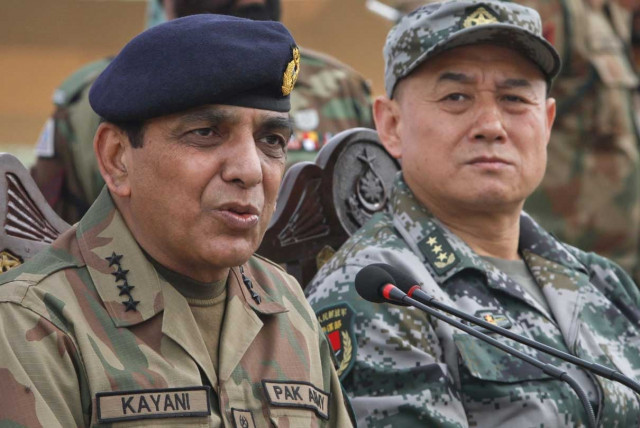Pakistan’s relationship with China
Right now, the perception that the military is the one who stands to benefit the most from it is a fair one.

Lest the world take him as speaking tongue-in-cheek, he added that China’s security was dear to Pakistan and such joint exercises would strengthen relations between the two countries, which were facing the common threat of terrorism. He further disarmed regional and global suspicion by pointing to the fact that Pakistan was in the routine of having such joint exercises with other countries as well and had conducted them with 50 other countries.
But the sad truth is that conflict is still the working paradigm in South Asia and in the world. When General Kayani said ‘purely strategic’ relations with China, he probably thought that this would take the adversarial regional mind away from ideas of hostile combinations of force. The fact is that the Jhelum exercise will not fail to elicit negative interpretation and much of that will be based on ‘explanatory’ statements made in Pakistan but not in China, where foreign policy intent is not worn by the politicians on their sleeves.
Unless suspicion is disarmed through codependent trade relations with India, the neighbouring state will go towards seeing any Pakistan-China development as directed against it. India sees much more in the Karakoram Highway, built by the Chinese, than just a trade artery. It says it is a flanking move to challenge India in Kashmir, where Indian troops are deployed, and that Chinese troops are actually deployed in the Gilgit-Baltistan region (something that both Pakistan and China have denied). India has always linked Pakistan’s nuclear programme and its weaponisation to China. The rest of the world, too, is suspicious of China’s policy towards South Asia in general and Pakistan-Afghanistan in particular. In Pakistan, strategists don’t help by looking at the American presence in Afghanistan as being aimed against China — as a challenge to China’s forward move in Central Asia. Pakistani leaders openly say that new contacts with China should be aimed at shifting Pakistan’s big traditional dependencies on America to its all-weather friend, China. Of course, this can have its negative effects in Pakistan, where cheap Chinese imports could deal a devastating blow to local industry and businesses.
What makes matters worse is that Pakistan’s relationship with China is — as is much of foreign policy— dictated by the military which dominates policymaking and sets the narrative and public discourse on how we perceive and deal with the outside world. This is perhaps why we are programmed to look at relations with China as a counter to Indian influence in the region and seem to prefer it over relations with America, which happens to be one of our largest aid donors and largest trading partners. Over time, the elected civilian government in Pakistan needs to take greater ownership of this bilateral relationship so that it can be weaned away from purely defence to social sectors. Right now, the perception that is determined by the armed forces in Pakistan is a fair one, and it is inevitable that the military is the one who stands to benefit the most from it. Of course, this is merely to point out that the benefits of such a deep relationship should accrue also to ordinary Pakistanis, especially in fields which concern and benefit them.
Pakistan’s isolationism and internal civil-military contradictions are retarding its progress towards a prosperous market state that can look after its large population better. To achieve this, Pakistan must stay on the course of normalising its relations with India through free trade and allowing India to trade with Central Asia through its territory the same way it is willing to serve as a transit territory for the movement of goods from Gwadar to the western regions of China. If we were to learn the philosophy behind China’s conduct in addition to just doing military exercises, we would do what the world wants from us and not adopt an unrealistic defiant posture.
Published in The Express Tribune, November 26th, 2011.














COMMENTS
Comments are moderated and generally will be posted if they are on-topic and not abusive.
For more information, please see our Comments FAQ